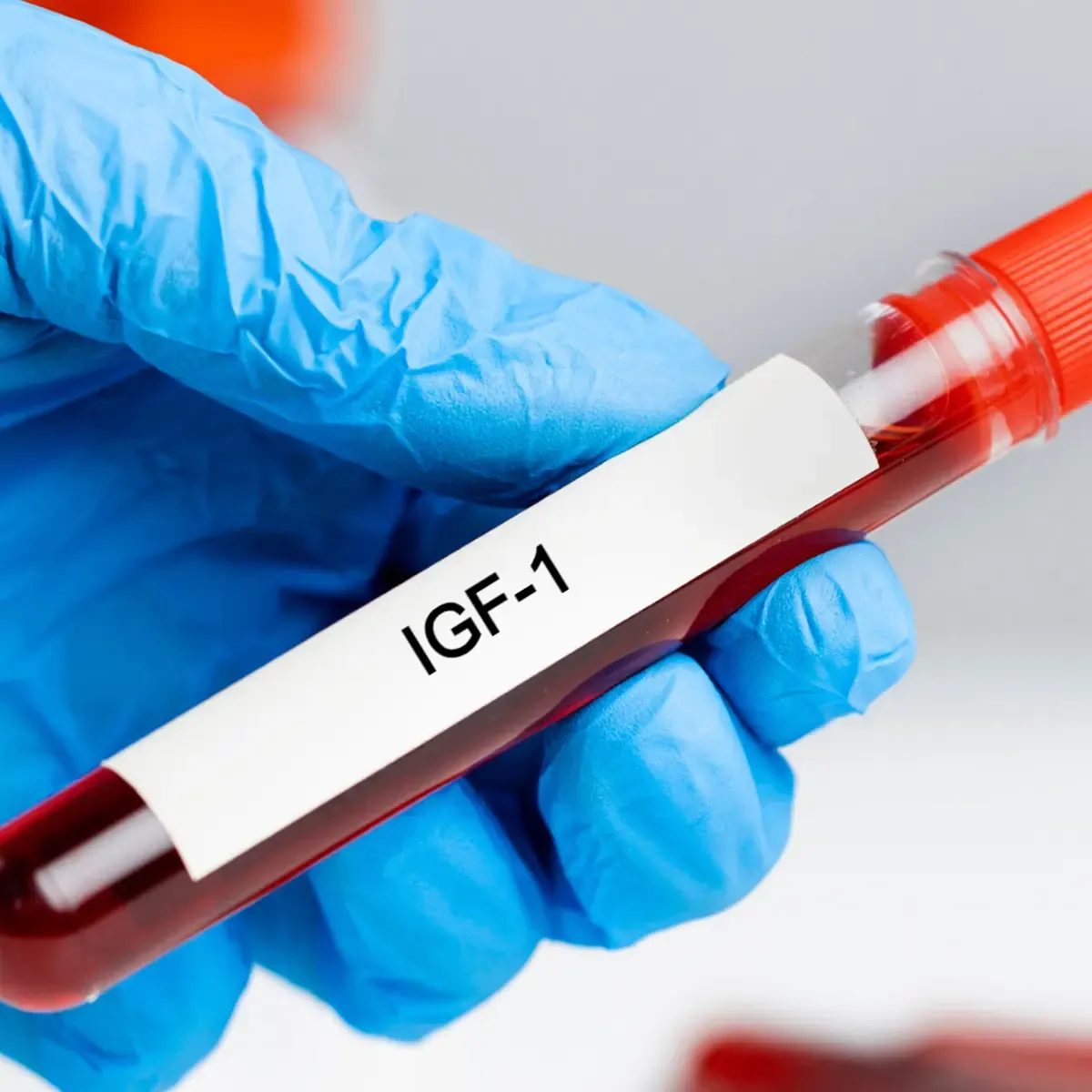Growth Hormone (IGF-1) Lab Test
Growth Hormone (IGF-1) Lab Test
Growth Hormone (GH)
Growth hormone (GH) is a naturally occurring hormone in the human body, which is secreted by the pituitary gland. GH is a very small protein substance that is chemically similar to insulin. It is secreted in short pulses during the first few hours of sleep and after exercise. GH promotes the growth of cells, bones, collagen, muscles and organs throughout the body throughout life.
The body is composed of more than 100 trillion cells that are continuously dying and regenerating. The brain and the nervous system retain their original cells; however, in the brain new proteins are continuously being produced to store memories of every new experience. Overall intelligence and the ability to learn and memorize all depend on adequate growth hormone.
Our bodies naturally produce GH in abundance when we are young, but its production gradually slows over time. Production of GH peaks during adolescence and falls after the age of 21 by about 14% per decade. By age 60 GH production is reduced by one-half. Healthy humans produce 500 micrograms per day at age 20, 200 micrograms per day at age 35. Between the ages of 70 and 80, the GH production can drop as low as 25 mcg per day. Individuals with higher levels of GH appear more youthful and report greater vitality and stamina.
Signs and Symptoms of Low GH
If you are diagnosed with low GH, it may come as a surprise. That’s because growth hormone-deficient adults may have been told that their symptoms were simply due to “aging.”
Symptoms of low Growth Hormone:
- Decreased collagen production
- Wrinkling and sagging of skin
- Stiffening of joints
- Hardening of arteries
- Decreased muscle strength
- Body/Joint aches
- Decreased Lean Body Mass
- Increased body fat
- Decreased bone mass
- Increased cholesterol
- Moodiness, anxiety and apathy
Because many other conditions can also cause these symptoms, it is important to consult with a doctor who specializes in hormone therapy and can provide you with a comprehensive assessment of all your key hormones.
What causes low GH?
Low GH can be caused by your own genetic programming, or other environmental influences, including excessive oxidative damage, damage to the pituitary gland, surgery or radiation treatments that affect the pituitary.
Growth Hormone Testing
Growth Hormone is difficult to measure because of its pulsatile variation throughout the day. Insulin-like Growth Factor-1 (IGF-1) is a related hormone produced in response to the secretion of GH that is used to measure GH activity. Unlike the pulsatile pattern of Growth Hormone secretion, IGF-1 levels are relatively constant and provide a superior marker of GH status in the body. Low levels of IGF-1 are associated with decreased cardiac function, increased visceral fat mass and frailty due to decreased lean muscle mass.
Growth Hormone Functions
GH is one of many endocrine hormones, like estrogen, progesterone, testosterone,
Melatonin and DHEA, that all decline in production as we age. Hormones are tiny
chemical messengers continuously secreted in the bloodstream in order to regulate
the activities of the vital organs. The word "hormone" is derived from a Greek word
meaning to stimulate. Many of these hormones can be replaced to deter some of the
effects of aging.
GH supplementation has been found to reverse age-related symptoms including increased body fat, decreased muscle mass, decreased collagen production, increased cholesterol, decreased stamina and energy, decreased mental function, sagging and wrinkling of the skin. When GH levels fall below the optimal range, supplementation can boost the body’s internal supply and production.
Are there side effects?
There are known side effects with injectable Growth Hormone. In clinical trials, the majority of the adverse symptoms associated with injectable GH consisted of mild to moderate fluid retention, including peripheral swelling, joint or muscle pain and stiffness of the extremities, tingling or decreased sensitivity. These events were reported early during therapy, and tended to be transient and/or eliminated with reduction of dosage. The major problem with GH supplementation is that it must be injected daily, it is very expensive, and it suppresses the body’s natural GH production. For this reason, I do not prescribe or recommend injectable GH. Instead, I recommend a 29 amino acid precursor polypeptide for Growth Hormone known as Sermorelin.
When should I consider Supplementing GH?
On average, GH levels in men and women, begin to decline by age 35 and symptoms begin to become evident at that time. The best time to start replacing hormones is between age 35 and 40. It is easier and more effective in your 40’s than waitng until your have already developed severe collagen losses and thinning and wrinkled skin, stiffened joints and hardened arteries.
Testing Details
Hormone to be Tested: IGF-1
Sample Type: Blood Serum
Collection Method: In person at Hansen Clinic
Timing: Testing should be in the AM; No specific testing time is required if you are not currently taking GH Supplements; if you are taking any GH Supplementation like Sermorelin, you should take your evening dose of Sermorelin precisely 12 hours, or as close to 12 hrs as possible, before your scheduled next morning testing time.
Scheduling Your Lab Test: To schedule your blood test, please call the Hansen Clinic at 480-991-5092.

